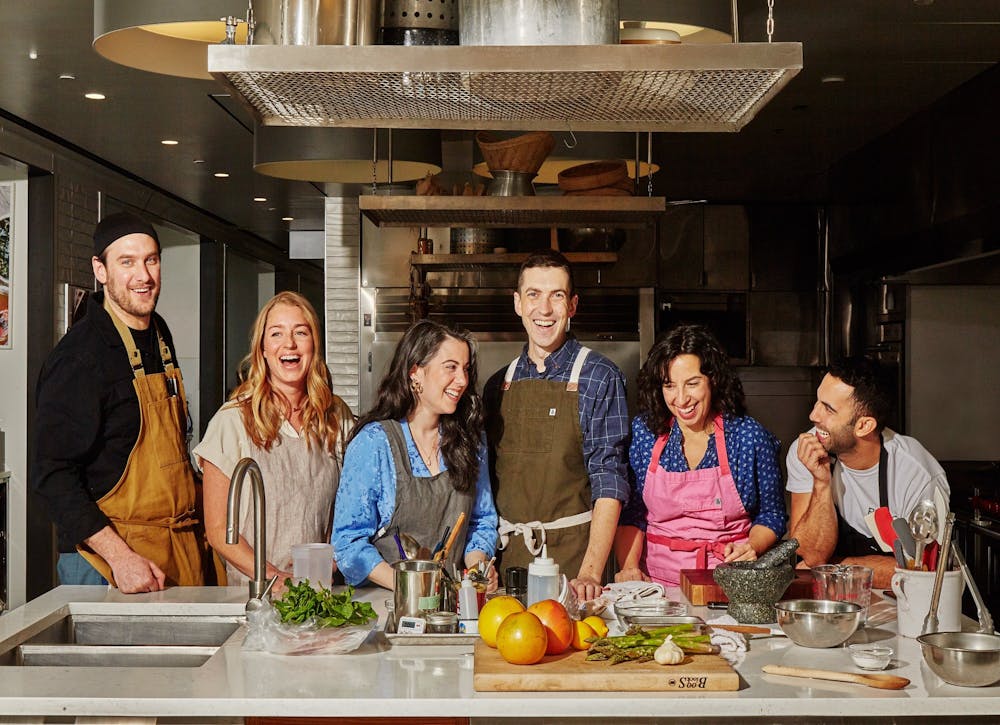Dakota Johnson’s Architectural Digest home tour is therapeutic. Floor-to-ceiling glass walls, basil green kitchen cabinetry, a cozy home office lined with Hollywood memorabilia and mid-century armchairs — these are the small details that brighten up my day.
Her home tour is part of a YouTube bubble that I turn to as a form of escapism. From Vogue makeup tutorials filmed in celebrity bathrooms to lavish New York City apartment tours interrupted by attention-seeking puppies, I often find myself gravitating toward homey videos flaunting authenticity and candidness.
The wildly successful Bon Appétit Test Kitchen used to be at the top of that list. But now, after a series of workplace reckonings, empty commitments toward change and new additions to the Test Kitchen cast, it’s clear that what originally drove the channel toward internet virality is now gone.
In June, when Condé Nast’s food publication Bon Appétit was publicly criticized over its mistreatment of BIPOC employees, the magazine released multiple statements committed to equitable change in the workplace. The company fired several racist staff members and the former editor-in-chief resigned. However, months after these actions took place, testimonies from employees of color revealed that it was all “lip service,” and that their new contracts were “nowhere near equitable.” As a result, 10 of the 13 members of the Bon Appétit Test Kitchen announced that they would not appear in video production for the magazine.
And now, they’ve been replaced by employees that are markedly more diverse than the original cast of the Test Kitchen. One chef, DeVonn Francis, is a queer, first-generation Jamaican-American chef and founder of Yardy, a food company focused on healing and community for marginalized communities; another chef, Harold Villarossa, is a Filipino-born, South Bronx-raised “culinary ambassador, activist and restaurant vet.” Each of the eight new chefs brings forth a unique set of perspectives, reflecting Bon Appétit’s newfound commitment to “listening, learning and building something together.”
Some have applauded the publication for making strides toward a more diverse workplace. Some viewers — and by some, I mean an overwhelming majority — have openly criticized the company for tokenizing BIPOC workers and glossing over internal inequities. An introduction video for the kitchen’s new stars, titled “Why We Joined Bon Appétit,” has 5.9K likes and 48k dislikes. The comment section isn’t particularly positive, either: almost universally, comments are critical of the channel’s new era. As one user writes, “PANDERING THE HOUSEEEE LMAO,” and another surprisingly insightful comment states, “I dislike the tip toeing around the real issue at conde nast entertainment in inequality and wage suppression.”
The predominantly negative reactions to the new Test Kitchen cast provide a stark contrast to the generally positive media coverage that the old cast received prior to workplace reckonings. In old videos, there’s a natural flow in the workplace: pastry chef Claire Saffitz is freakishly stressed over recreating an American snack, while Alex Delany stops by for some workplace munchies and resident goofball Brad Leone fools around in the near background. In new videos, something feels forced, and viewers get the sense that the publication is attempting to sweep their unignorable past under the rug. In failing to correctly address concerns of racial inequity, Bon Appétit alienated audiences that crave the originality and candidness of the Test Kitchen — in essence, all of their viewers. As one comment puts it, it’s like they’re trying to tell their audience that they’re not racist because they have Black friends.
These criticisms point to a broader concern over “woke-washing,” a term that the Harvard Business Review describes as “appropriating the language of social activism into marketing materials.” In the age of “slacktivism,” it’s difficult to distinguish between solid commitments toward internal and external change and hollow gestures of solidarity. Bon Appétit, by refusing to explicitly address their previous mistakes, has succumbed to the latter.
The point of this article isn’t to criticize the new chefs, all of which come with their own distinct set of qualifications, experiences and perspectives. As viewers, we’re becoming fed-up: corporate lip service isn’t enough, and we are becoming more adamant about legitimate promises, tangible change in the media we consume. Statements of solidarity may be a starting point, but bringing back the comforting authenticity of the test kitchen will require organizational and individual accountability that starts with transparency, education and a radical rethinking of the toxic top-down power dynamic.
In the meantime, I will support former Test Kitchen chef Sohla El-Waylly in her personal pursuits in the Babish Culinary Universe. This time, she is actually getting paid.
Get The Chronicle straight to your inbox
Signup for our weekly newsletter. Cancel at any time.
Derek Deng is a Trinity senior and a recess editor of The Chronicle's 119th volume.

